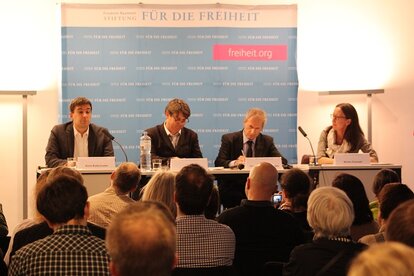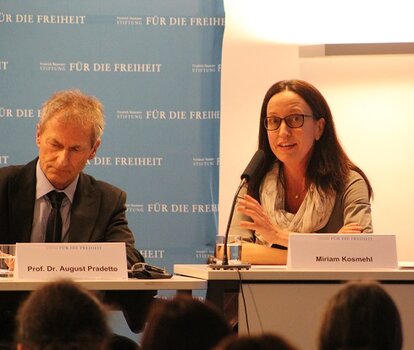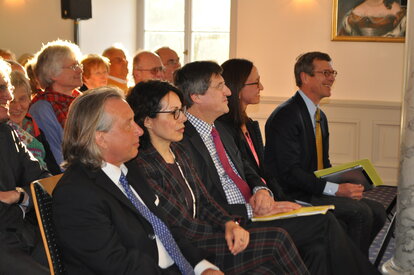Ukraine in Germany

Speakers in Hamburg Panel
With crises from other parts of the world dominating the news in Europe, the crisis directly at our European front door is no longer in the headlines. Two years after the Revolution of Dignity ended in the ouster of (ex-)president Yanukovych, the Friedrich Naumann Foundation for Freedom highlighted the lasting importance of political and societal developments in Ukraine. While the revolution has voted the old guard out, the system has not yet been broken. Three panels in Hamburg (April 15th), Kiel (April 16th) and Bad Homburg (April 26th), the last in cooperation with the Karl Hermann Flach Foundation, addressed the crisis and the war but also some promising perspectives and examples for sustainable modernization and change in Ukraine on its way from a post-Soviet “corruption-state” to a state under the rule of law.

Mr Pradetto and Mrs Kosmehl on the Panel in Hamburg
In Hamburg and Kiel, journalist Boris Reitschuster, political scientist August Pradetto and the project director of the Friedrich Naumann Foundation for Ukraine, Miriam Kosmehl, faced questions from the moderator, Jan Puhl from the German magazine Der Spiegel (Hamburg), and from Stefan Hansen of the Institute for Security Policy (Kiel) on how to interpret the political stalemate in Ukraine caused by the resignation of the reform-minded (ex-)economics minister in February as well as how to solve the deadlock to the implementation of the Minsk peace agreement and deal with Russia’s unpredictable assertiveness on the world stage. It was underlined that freezing the war in eastern Ukraine implies that it can be ‘unfrozen’ at discretion, a tactic which has already been used before to the detriment of a frozen war’s ‘mother country’ and which reduces that country’s Western orientation – which is why such conflicts must be solved, not just frozen.

Bad Homburg Panel
In Bad Homburg the focus was more clearly on Ukraine, with the Moderator, Christoph von Marshall of the German daily Tagesspiegel, asking the panel guests, Sabine Adler of Deutschlandradio, political scientist Thomas Jäger, vice-chairman Karl-Heinz Paqué and Miriam Kosmehl of the Friedrich Naumann Foundation, for traits that make Ukraine particularly vulnerable during its reform trajectory. Discussing reform processes and the differences between old and new elites in detail, the main message was that financial and technical assistance to Ukraine should be tied to Ukraine staying on the reform path and to firmly support the well-coordinated network of Ukrainian civil society experts with reformers in the executive and in parliament during their big challenge against what has turned out to be an oligarchic counter-revolution. Foreign partners tend to underestimate the harm being done by combining (justified) pressure for reforms with (unreasonable) claims linked to the implementation of the Minsk agreements. Since the political troubles and difficulties with respect to achieving lasting reforms in Ukraine are not directly related to the problem of war with Russia, both must be kept separate. Otherwise, reformers are being discredited, which plays into the hands of the Kremlin and its intention of destabilizing Ukraine. Therefore, targeted reform from above in the key areas of justice and in respect to the still mighty apparatus of the public prosecutor’s office must remain in the centre of the foreign partners’ significant but unambiguously conditional support.
Have a look in the event in Bad Homburg:
"In der Endlosschleife von Krise und Krieg. Scheitert die Ukraine auf dem Weg nach Europa?"
As for European action towards Russia, everyone agreed that at least displaying a unified position when it comes to targeted sanctions against Russian decision-makers must remain at the core of the Western partners’ basic strategy in order to counteract the dire human rights and humanitarian situation in the occupied territories of Ukraine. There, a culture of impunity is spreading that will deepen the gap between Ukrainians living in different regions, further hampering future conflict resolution and providing an area of instability.
For more information about FNF's work in Ukraine, please visit their website and Facebook Page.